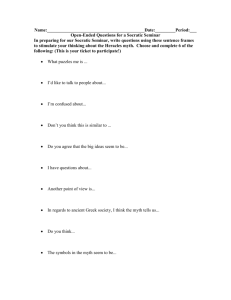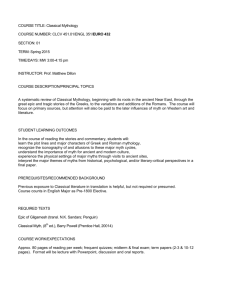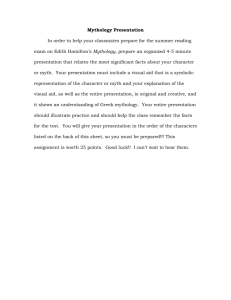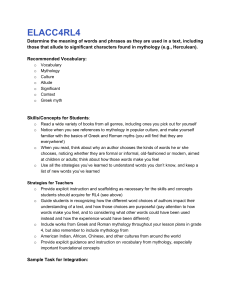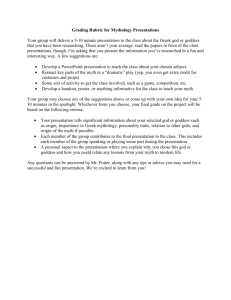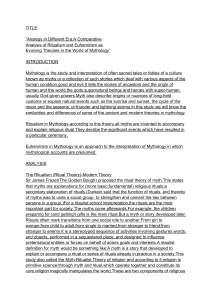The power of Myth
advertisement
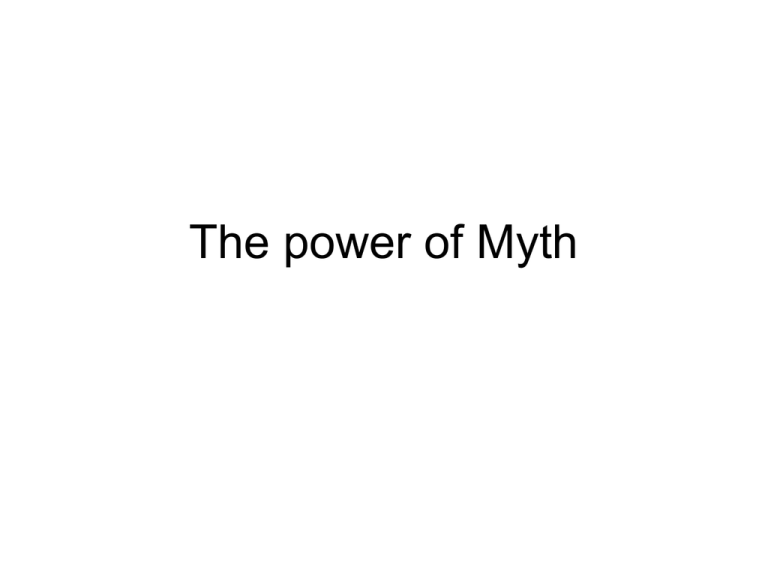
The power of Myth • If a being from another world were to ask you, “How can I learn what it’s like to be human?” What would a good answer be? • If a being from another world were to ask you, “How can I learn what it’s like to be human?” a good answer would be, “Study mythology.” • Life itself has no “meaning” – it simply is. • Stories have meanings, so we tell stories to give meaning to life, to try to understand and interpret it. • We tell stories about the origin of the world, the struggle to stay alive, the fight against the greed and evil that lie within us all. • Each culture clothes the stories in the specifics of its own time and place. • Prehistoric humans drew on cave walls. – Their art and oral literature gave form to impulse what we now call religion • The movies of their day- the drawings are the hunter’s effort to honor himself, his fear, his triumph, and the creature he had to kill to feed his family. – Every later culture invented its own names for its heroes and villains, gods and monsters, defeats and victories. What are myths? • Myths are stories of our search through the ages for truth, for meaning, for significance. • Myths are clues to the spiritual potentialities of the human life. • Myth helps you to put your mind in touch with the experience of being alive. It tells you what the experience is. – For example, marriage. The myth tells us that marriage is the reunion of the separated duad. Originally you were one. you are now two in the world, but the recognition of the spiritual identify is what marriage is. – The biological is the distraction which may lead you to the wrong identification. – Your inner being tells you who is the right person to marry. Why do you/us need mythology? • Myths are the heart of a system of belief and rituals evoke it • Mythology is the song of the imagination • A myth is a mask of God- a metaphor for what lies behind the visible world. “We have mythology” • In Japan, for an international conference on religion, an American (a social philosopher from New York) said to a Shinto priest, “We’ve been now to a good many ceremonies and have seen quite a few of your shrines. But I don’t get your ideology. I don’t get your theology.” The Japanese paused as though in deep thought and then slowly shook his head. “I think we don’t have ideology,” he said. “We don’t have theology. We have mythology.” • All info taken from the book The Power of Myth by Joseph Campbell with Bill Moyers Rituals • Most forms of worship are carried out through some formal practice, or ritual. • Rituals are concrete, visible actions that have symbolic meaning for a group or community. • They are done in a similar way every time they are performed • Example: – Graduation ceremony with the customary speeches and awarding of diplomas. – Birthday party with the singing of “Happy Birthday,” cutting of the cake, and the opening of presents. • Many religious rituals re-enact a myth or sacred story Stages of Ritual • Religious rituals re-enact an important myth and provide a way for individuals to connect with the power of their mythology • Rituals celebrate important events in an individual’s life or society’s life cycle 1. The journey – Takes place away from home, participants must be removed from their normal life 2. The liminal – It occurs midway through the ceremony – Betwixt and between (neither one status nor the other) – A temporary stage – The ritual participant has entered the sacred space and will be a different person when he/she leaves – Usually a symbolic death takes place – via circumcision, baptism, etc. = the symbolic death allows for the individual to receive new knowledge and a new identity to assume 3. The return – The return to the real world but now the participants hold a new status Example of stages of Ritual • Graduation – The Journey = finals week approaches, students study, take final exams, pass courses with acceptable grades – Liminal = classes stop. It’s the end of the routine. Students travel to commencement ceremony, wear special gowns, hear motivational speeches meant to impart final words of wisdom, and receive diploma (which becomes a totem represent the completion of their studies and their status as educated). – The Return = students must find work to begin “adult life” in the “real world”
